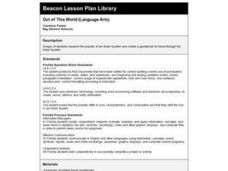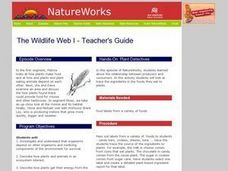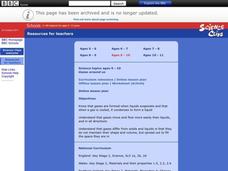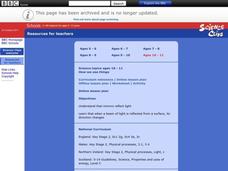Curated OER
Air Masses
Students examine the physical characteristics of several types of air masses to discover how air masses can be identified and defined by their temperature and moisture content.
Curated OER
Our Solar System to Scale
Students calculate the diameter of planets and their relative distances. In this space science lesson, students discover how small or big the planets are in comparison to each other. Students use cross multiplying fractions to find the...
Curated OER
What is a Tropical Rainforest?
Students investigate amounts of rainfall in selected world rainforests by creating a bar graph showing rainfall in inches for each. They convert inches to millimeters, and solve word problems having to do with rainfall in selected world...
Curated OER
Planetary Poster
Students engage in a study about the planets and create a poster as one of the projects during the study. They create individual charts for mapping the solar system so the locations can be found in mock space missions to other planets.
Curated OER
Out of This World (Language Arts)
Second graders, in groups, research the planets in the solar system and create a guidebook for travel.
Curated OER
The Wildlife Web I
Students explore the relationship between producers and consumers. In this activity, they trace the ingredients in the foods they eat to plants. Supplement to Natureworks episode from New Hampshire Public Television, but activities may...
Curated OER
Math: Checking Scale Drawings for Accuracy
Students critique their own drawings for accuracy and make constructive suggestions prior to reworking them. They discover how scale in maps and drawing relate to relative size and distance. In addition, students comprehend the...
Curated OER
Everybody Needs a Rock
Second graders examine science non-fiction books in the 500 section of the media center. They listen to Byrd Baylor's, Everybody Needs a Rock, and write a sentence that tells why everyone does need a rock. They illustrate the sentence.
Curated OER
Discover the Planets
Third graders research the planets. In this science instructional activity, 3rd graders create PowerPoint presentations over a planet. Students present their findings.
Curated OER
The Terrible Transformation: Freedom Denied
Students learn about the legal foundations for slavery and explore autobiographical writings of slaves. Students trace the development of laws that enforced the slave status of Africans and their descendants.
Curated OER
Ourselves
Young scholars use a website to name and compare external body parts of humans and other animals.
Curated OER
Sound and Hearing - Internet Research
Young scholars use a website to help them recognize that sound is generated in a variety of ways and from different sources. They determine that sounds vary in tone and loudness, and learn there are different ways to describe sound.
Curated OER
Moving and Growing
Learners know that humans and some other animals have bony skeletons inside their body. They know that other animals have skeletons on the outside of their bodies. They explain the role of both kinds of skeletons.
Curated OER
Circuits and Conductors
Pupils participate in an online lesson to explain the conductivity of different materials and the effect of changing the power source.
Curated OER
Gases Around Us
Students participate in an online lesson showing that gases are formed when liquids evaporate and that when a gas is cooled, it condenses to form a liquid, and gases move and flow more easily than liquids, and how gases differ from solids.
Curated OER
Changing State
Students participate in an online lesson plan to investigate the effects of cooling and heating on water.
Curated OER
Changing Sounds
Young scholars identify how the pitch and the loudness of an instrument can be altered by examining the sounds made by three instruments.
Curated OER
Helping Plants Grow Well
Learners explain the effect of water, temperature and light on plant growth.
Curated OER
Micro-organisms
Students examine how micro-organisms are living organisms that are often too small to be seen. They explain that micro-organisms may be beneficial or harmful.
Curated OER
Forces in Action
Students ask questions that can be investigated scientifically. They determine how to plan a fair test by changing one factor while keeping other factors the same, to use measurements to draw conclusions and use scientific knowledge to...
Curated OER
How We See Things
Students explain that mirrors reflect light. They examine how when a beam of light is reflected from a surface, its direction changes.
Curated OER
Changing Circuits
Young scholars participate in an online instructional activity to explain how to make bulbs brighter or dimmer in a series circuit by changing the number or type of components.
Curated OER
Space Trading Cards
Young scholars use the Internet and other reference sources to gather information on a space topic. They create a trading card displaying the information learned and import pictures from libraries and the Internet.
Curated OER
Cloud Shadows
Young scholars classify the visual opacity of various materials, what is needed to create shadows, and classify clouds by the types of shadows that they produce.

























